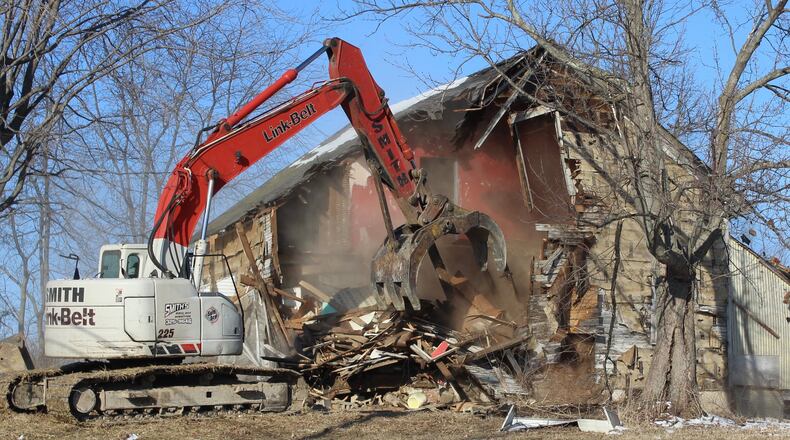By the numbers
$150,000 — Matching money Clark County received for demolitions
$45,000 — Matching money spent by Clark County
22 — Home razed by Clark County since December
Unmatched coverage
Reporter Tiffany Latta dig into how Clark County spends taxpayer dollars, including grants for demolitions and pay raises.
Clark County received about $150,000 in matching money to demolish vacant and abandoned homes, but will likely spend less than a third of it.
David Fleck, Clark County community development grants coordinator, said the county might spend just $45,000 of the matching funds allocated to the county through the state’s Moving Ohio Forward Demolition Program.
The remaining money will be returned to the state because the county, townships and villages haven’t been able to come up with the local money to match the grant dollars.
Since December, the county has razed 22 houses and Fleck expected to demolish five more before the May 31 deadline.
The county has the money do more, Fleck said, but “we have to get people to step up with matching money … But right now these townships and villages are cash strapped.”
The national mortgage settlement awarded $25 billion in relief to distressed borrowers. The agreement settled state and federal investigations that accused the country’s five largest loan servicers of violating laws by signing foreclosure documents without a notary public and without knowing whether the facts in those documents were accurate.
All 88 counties applied to the Ohio Attorney General’s Office for a portion of $75 million in demolition grants that are part of Ohio’s settlement.
Clark County and Springfield received a total of $943,000 from the program.
The entities split the first $500,000, with the county getting $235,000 and the city about $265,000. Those grants didn’t require the local governments to provide any matching money from their budgets.
That left about $443,000 for the city and county to use that required the use of local money to match the grant dollars.
The county asked townships and villages to contribute to its matching share, but due to tight budgets, many area townships and villages haven’t participated.
The only matching funds the county received came from the treasurer’s office, which late last year appropriated $50,000 in delinquent real estate tax funds toward the program.
Half of the money will be used to demolish structures in townships and villages. The remaining money will be used to demolish homes in the city.
Many municipalities that received the grants requiring matching money struggled to do so.
Bryan Heck, the city’s planning and zoning administrator, said the city has demolished 82 homes using money from the state program and expects to raze 20 to 25 more, falling just short of it’s estimated goal to level 150 homes.
Heck said he’s not surprised that Clark County and other municipalities were unable to find matching dollars.
“Similar to other communities across the state it’s a difficult time in terms of resources. It’s a challenge for all communities … It was more of a challenge with the county because they had to work with multiple jurisdictions,” Heck said.
The Attorney General’s Office recently released an additional $3.8 million to all Ohio counties except Warren County, which declined it, and none of the funds require municipalities to get matching dollars, said Dan Tierney, a spokesman for the Ohio Attorney General’s Office,
Clark County received about $46,500 as part of this second phase of the state’s demolition program.
The city will use 75 percent of that money and the county will get 25 percent. The deadline for municipalities to spend the new money is Sept. 30.
Tierney said finding matching dollars in the first phase of the program was an issue in some cases, but in other cases the municipalities that received the money didn’t have enough projects for demolition.
“It’s not unique to Clark County or Springfield … It’s one reason the second phase is all non-match,” said Shannon Meadows, the city’s community development director.
Champaign County has received more than $256,800 in the first and second phases of the program and wasn’t required to using matching funds.
The county has demolished nearly 23 homes and has used all but about $60,000 of the money, said Amy Schocken, a consultant handling the Moving Forward Ohio grant for Champaign County.
Schocken said officials hope to demolish eight to 10 more homes with the remaining money.
Champaign County Administrator Andrea Millice said the program has benefited the community.
“It’s really cleaned up some eyesores,” Millice said.
Clark County last week demolished a home at 9608 Broadgauge Road.
Heck said vacant homes can negatively affect neighborhoods and impact property values.
“(Demolition programs) stabilize our housing market. Vacant and abandoned homes bring down property values,” Heck said.
Nancy Brown, a Bethel Twp. trustee, said the township had four homes razed through the program in October without matching funds.
“It was houses that really needed to have something done,” Brown said.
The township hasn’t had any homes demolished that required matching fund.
“The state takes your local funding and then says participate in this program using local matching funds. We’re treading water. We don’t have (the money),” Brown said.
About the Author
